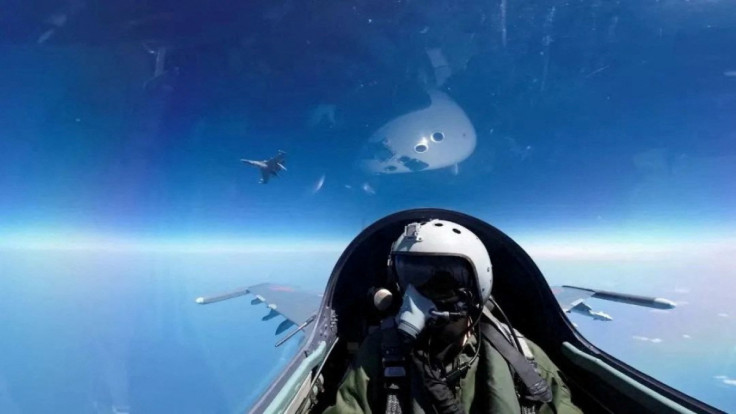U.S. Says It Is Monitoring China's Drills Around Taiwan Closely

The United States is monitoring China's drills around Taiwan closely and is "comfortable and confident" it has sufficient resources and capabilities regionally to ensure peace and stability, the de facto U.S. embassy in Taiwan said on Sunday.
China, which claims democratically governed Taiwan as its own territory, began three days of military exercises around the island on Saturday, the day after Taiwan President Tsai Ing-wen returned from the United States.
Most of Saturday's activities ended by sundown, a Taiwan security source told Reuters
While in Los Angeles, on what was officially billed a transit on her way back from Central America, Tsai met with the speaker of the U.S. House of Representatives, Kevin McCarthy, despite Beijing's warnings against it.
"We are monitoring Beijing's actions closely," said a spokesperson for the American Institute in Taiwan, which serves as the de facto embassy in the absence of formal diplomatic ties.
"As we have said, there is no reason for Beijing to turn this transit - which was consistent with longstanding U.S. practice and policy - into something it is not or use it as pretext to overreact," the spokesperson added.
U.S. channels of communication with China remain open and the United States has consistently urged restraint and no change to the status quo, the spokesperson said.
"We are comfortable and confident that we have in place sufficient resources and capabilities in the region to ensure peace and stability and to meet our national security commitments."
Washington severed diplomatic relations with Taipei in favour of Beijing in 1979, but is bound by law to provide the island with the means to defend itself.
China, which has never renounced the use of force to bring the island under its control, says Taiwan is the most important and sensitive issue in its relations with the United States, and the topic is a frequent source of Sino-U.S. tensions.
Beijing considers Tsai a separatist and has rebuffed her repeated calls for talks. Tsai says only Taiwan's people can decide their future.
CHINESE FIGHTERS AND WARSHIPS
China has over the past three years or so stepped up its military pressure against Taiwan, flying regular missions around Taiwan, though not in its territorial air space or over the island itself.
Taiwan's Defence Ministry said on Sunday morning that in the past 24 hours it had spotted 71 Chinese air force aircraft and nine navy vessels around Taiwan.
The ministry published a map showing around half of those aircraft, including Su-30 and J-11 fighters, crossed the median line of the Taiwan Strait, which normally serves as an unofficial barrier between the two sides.
The ministry had indicated on Saturday night that all 71 aircraft had crossed the line, but clarified the number on Sunday with the map, showing where the crossings were made and by how many aircraft.
Chinese state media said the aircraft are armed with live weapons. Taiwanese air force jets also typically carry live weapons when they scramble to see off Chinese incursions.
Late on Saturday, Taiwan's Ocean Affairs Council, which runs the Coast Guard, put out footage on its YouTube channel showing one of its ships closely shadowing a Chinese warship, though did not give an exact location.
"You are seriously harming regional peace, stability and security. Please immediately turn around and leave. If you continue to proceed we will take expulsion measures," a Coast Guard officer radios to the Chinese ship.
Other footage showed a Taiwanese warship, the Di Hua, accompanying the Coast Guard ship in what the Coast Guard officer calls a "standoff" with the Chinese warship.
Still, civilian flights around Taiwan, including to Kinmen and Matsu, two groups of Taiwan-controlled islands that sit right next to the Chinese coast, have continued as normal.
In August, civilian air traffic was disrupted after China announced effective no-fly zones in several blocks close to Taiwan where it was firing missiles.
Taiwan has been seeking to restart exchanges paused during the COVID-19 pandemic to show goodwill to Beijing, including permitting flights to resume to a large number of Chinese cities, but Beijing has complained Taipei is being too slow.
The People's Daily, the official newspaper of China's ruling Communist Party, said in a commentary on Sunday that peace, development, exchanges and cooperation were the "common aspiration" of people on both sides of the Taiwan Strait.
"Compatriots on both sides of the strait have the same roots and the same culture. They are a family whose blood is thicker than water. Both benefit from peace, both win from cooperation," it said.
© Copyright Thomson Reuters {{Year}}. All rights reserved.





















